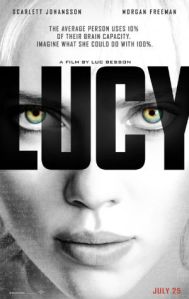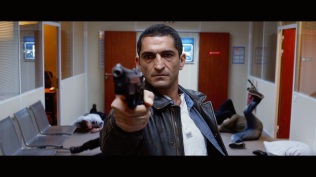Lucy, by Luc Besson, has just been released UK cinemas to a mixed response. Let me put my cards on the table right now, I thoroughly enjoyed the film. Is it perfect? Of course not. Very few, if any, films are perfect. In fact I’m not sure if I can think of any ‘perfect’ piece of entertainment—although that debate is open if anyone want to put a candidate forward.
However, what Lucy does quite nicely is package the ‘high theory’ of becoming posthuman inside the easier to swallow pill of a fast paced, violent action movie.
Lucy [Scarlett Johansson] a foreign student in Taipei, inadvertently becomes a drug mule for some terrifying Korean gangstars [ lead by Min-sik Choi] when she shacks up with the wrong guy [a stupidly dressed Pilou Asbaek—Kasper Juul to Borgen fans—with a junkie’s infectious nervousness]. From there on things go from bad to worse for Lucy until the bag of drugs in her stomach is damaged when she resists a would-be rapist and the new drug enters Lucy’s system sparking her evolution to superhuman and beyond.
***SPOILERS follow, although I say nothing of the ending***
From the start Besson makes some interesting editing/directorial choices. Lucy, in the hotel reception waiting to hand over a briefcase to the gangsters is intercut with a cheetah stalking gazelles on the plains. Lucy and the gazelle’s situations are equally and obviously hopeless but, of course, life fights to stay living. This is one of the pervading themes of the film.
The intercutting of documentary footage, predominantly of animals and natural settings, continues throughout the movie. Initially jarring, when it accompanies the lecture given by Professor Norman (Morgan Freeman) on the ‘science’ of this sci-fi it begins to make more sense. Yes, this is a pretty simplistic way to deal with the ideas of how increased use of the human brain capacity could influence a human’s position in relation to the world around them, but it makes the central conceit accessible to all viewers. Although, the tone sometimes overbalances on the tightrope between understandable and patronising.
Knowledge is power, is another of Lucy’s themes. Unlocking the potential to use more than 10% of her brain, the eponymous protagonist learns to control herself to the point of being able to order her metabolism to spontaneously grow and change the colour of her hair to escape detection; then control the world around her seeing the signals of mobile phones [a gorgeous visual] and manipulate gravity; and finally she cracks the one constant that defines existence: time.
Despite the concepts of life beyond the flesh, transcendence and actual posthumanism—a move from anthropocentric [human at centre of everything] to an entity in tune with animals, nature, time and technology—the old fears of losing the body make an appearance. Professor Norman sets up a binary of choice for cells: immortality or reproduction. If the environment is adverse cells chose immortality, which in the case of Lucy means dissipation, a merging with the surroundings. The result is an unnerving body dissolving sequence in the confines of an airplane bathroom, already the site of terror for many flyers. The confined space contrasts with the reaction of Lucy’s body and brain which want to continue expanding. A warning that the flesh can only push at the boundaries so much before the strain results in destruction. Is the message ultimately conservative, as is often the case with science fiction?
The integration of technology into the body and dissipation into omnipresence that appear in Lucy have strong visual and thematic nods to two cult anime properties, Akira [Katshiro Otomo,1988] and Serial Experiments Lain [Yoshitoshi Abe, 1998]. In one of the final sequences of the film, Lucy’s body extends and distends into sinuous vines of black cables to form a supercomputer, which resembles an anime meets H.R. Giger design. This is both beautiful and unsettling which plays on our fear of the distortion of the human body, the fear of the other and the monstrous.
Here’s a long clip from the dub of Tetsuo’s terrifying loss of control and bodily mutation.
Yet there is a dispassionate control to Lucy’s transformation/integration of technology, as opposed to the violent, terrifying integration which overcomes Tetsuo at the climax of Akira. Is this a comment on the strength of the female, who undergoes numerous natural bodily changes and penetrations, to adapt to these evolutions in a way the male cannot? Besson certainly does favour female protagonists who take agency over their environments and kick serious ass, one of the reasons I went to see the film in the first place.
One of the major flaws of the film is the issue of emotion. Once Lucy gains control of her body’s responses she is driven by a need to pass on knowledge, to survive and follow through her evolution to its full conclusion but she loses her emotional responses.
A tearful phone conversation between Lucy and her mother marks her emotional peak. Overwhelmed by being able to feel, hear and see all around her as well as recalling all memories, even the taste of her mother’s milk, this is Lucy at her most vulnerable. She is also on a hospital bed, being operated on to remove the package of drugs. Here Lucy is shown completely without control; she has not gained a handle on the new sensations bombarding her and she is at the mercy of the surgeon’s scalpel. This forms a sharp contrast to the rest of the movie where slows Lucy gains control over everything.
This dispassionate, detached tone starts seeps into all elements of the movie which starts to remove the audience from their emotional involvement in what happens. We want to see her succeed, but we don’t feel her need to.
Like so many posthuman characters she becomes an automaton on a mission. This should be balanced out by the human characters around her. The instinct is there as Lucy is partnered with a French detective Pierre Del Rio [Amr Waked] in Paris to collect the other samples of the drug and evade the Korean gangsters. But Del Rio is also too hard, perhaps it is in the casting but he does not provide the more ‘feminine’ emotional counterpart to the rational traditionally masculine position that Lucy occupies. There is not enough time for them to generate a spark, one that would lend a stronger explanation to why Del Rio is prepared to form a last line of defence in a fight to the death to protect Lucy while she gains final evolution.
Despite the loss of emotion, Lucy is still worth a watch for the smart, concise way it engages with questions of human evolution, becoming posthuman and the sheer joy of the action sequences and gorgeous locations.



